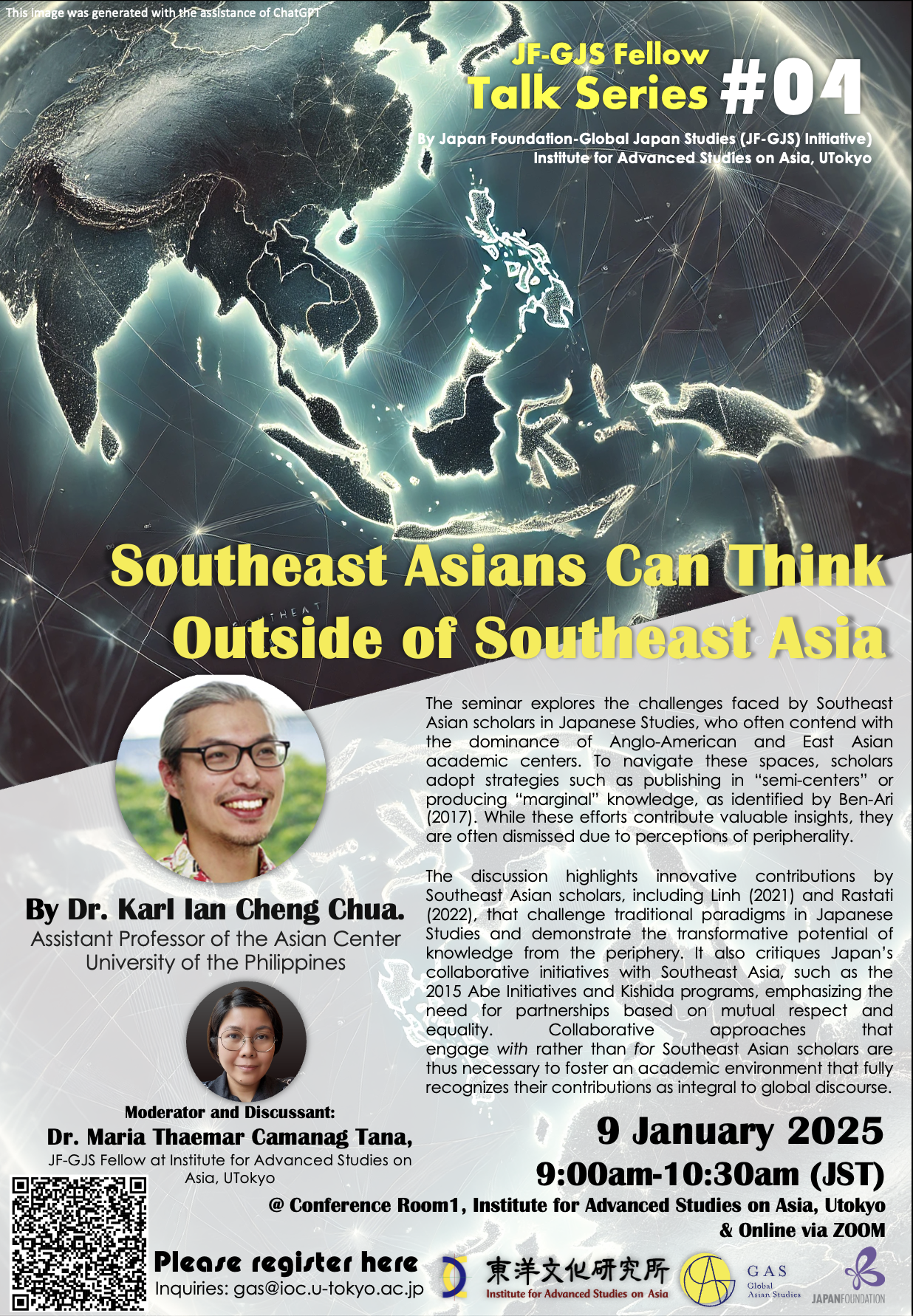- JF-GJS Initiative
JF-GJS Fellow Talk Series 4
Southeast Asian Can Think Outside Southeast Asia
- Finished
- Report
| Date and Time | January 9 (Thu), 2025, 9:00AM-10:30AM (Japan Standard Time) |
|---|---|
| Venue | On-site: Conference Room 1, Institute for Advanced Studies on Asia, University of Tokyo Online (Zoom) |
| Title | Southeast Asian Can Think Outside Southeast Asia |
| Speaker | Dr. Karl Ian Cheng Chua Karl Ian Uy CHENG CHUA is presently an Assistant Professor of the Asian Center, University of the Philippines - Diliman. Until 2020, he was Director of the Japanese Studies Program, Ateneo de Manila University. He is the Philippine Steering Committee Member of the Japanese Studies Association of Southeast Asia (JSA-ASEAN). He is part of the editorial board of Social Science Diliman and East Asian Journal of Popular Culture. He also is part of the editorial advisory board for "Comic Studies: Aesthetics, Histories and Practices" which is a series by Brill. |
| Chair | Dr. Maria Thaemar Camanag Tana JF-GJS Fellow Institute for Advanced Studies on Asia, the University of Tokyo; Associate Professor (incoming), Japanese Studies Program, Ateneo de Manila University |
| Language | English |
This event is held both online and in-person. Please register using the form below: https://docs.google.com/forms/d/e/1FAIpQLSf8RT-vsUkpYTfarTiIZgrwygh17CnUepOvXlIh4AhlKf97tQ/viewform?usp=sharing
The seminar explores the challenges faced by Southeast Asian scholars in Japanese Studies, who often contend with the dominance of Anglo-American and East Asian academic centers. To navigate these spaces, scholars adopt strategies such as publishing in “semi-centers” or producing “marginal” knowledge, as identified by Ben-Ari (2017). While these efforts contribute valuable insights, they are often dismissed due to perceptions of peripherality.
The discussion highlights innovative contributions by Southeast Asian scholars, including Linh (2021) and Rastati (2022), that challenge traditional paradigms in Japanese Studies and demonstrate the transformative potential of knowledge from the periphery. It also critiques Japan’s collaborative initiatives with Southeast Asia, such as the 2015 Abe Initiatives and Kishida programs, emphasizing the need for partnerships based on mutual respect and equality. Collaborative approaches that engage with rather than for Southeast Asian scholars are thus necessary to foster an academic environment that fully recognizes their contributions as integral to global discourse.
Event Report
On January 9, 2025, the Japan Foundation-Global Japan Studies (JF-GJS) Initiative and the Institute for Advanced Studies on Asia, University of Tokyo, hosted the fourth installment of the JF-GJS Talk Series. Dr. Karl Ian Cheng Chua, Assistant Professor at the Asian Center, University of the Philippines, delivered a lecture titled “Southeast Asians Can Think Outside of Southeast Asia”, exploring the challenges and opportunities for Southeast Asian scholars in global academia, particularly within Japanese Studies.
Dr. Cheng Chua discussed how academic knowledge production remains dominated by Anglo-American and Japanese institutions, with English as the global academic language. This structural imbalance often confines Southeast Asian scholars to topics focused on their own region, making it difficult to engage in broader academic conversations on equal terms. He highlighted how Japanese Studies, shaped by both the Anglo-American and East Asian spheres, leaves Southeast Asian scholars navigating dual pressures while struggling for visibility. Many scholars attempt to bridge this gap by publishing in “semi-centers,” but this reinforces linguistic and financial peripherality rather than creating truly independent research spaces.
The discussion also examined the notion of “marginal knowledge,” where Southeast Asian scholars engage with dominant academic frameworks but remain dependent on them. Dr. Cheng Chua suggested that shifting toward “provincial knowledge” produced in local linguistic and academic systems could help build independent intellectual spaces. However, this requires stronger institutional support, collaborative regional networks, and alternative publishing platforms that prioritize Southeast Asian perspectives rather than adapting to dominant academic models.
The lecture also addressed Japan’s initiatives to collaborate with Southeast Asia, including the Abe Initiatives and Kishida’s WA Project 2.0. While these programs provide opportunities, they often reinforce hierarchical relationships, positioning Southeast Asian scholars as research subjects rather than equal intellectual partners. True collaboration, Dr. Cheng Chua argued, requires moving beyond one-way knowledge transfer. Southeast Asian scholars should play active roles in shaping research priorities, leading projects, and co-designing collaborative frameworks. Japan, in turn, must recognize Southeast Asian scholars as contributors of original knowledge, rather than as passive participants in academic partnerships.
Following the lecture, Dr. Maria Thaemar Camanag Tana, JF-GJS Fellow at the Institute for Advanced Studies on Asia, provided a response reinforcing the need for Southeast Asian scholars to reclaim agency in global academia. She emphasized the importance of reframing peripherality as a strength by developing independent research networks, promoting regional collaboration, and advocating for more inclusive publishing practices. The discussion raised key questions about how Southeast Asian scholars can assert their intellectual authority, how multilingual publishing and translation can enhance visibility, and how partnerships with Japan can evolve to ensure more equitable collaborations.
The Q&A session explored the role of funding for regional research networks, the potential of digital platforms in overcoming language barriers, and strategies for strengthening Southeast Asia-led academic initiatives. Dr. Chua’s lecture underscored the urgent need for
systemic change, where Southeast Asian scholars are not seen as peripheral but as central to shaping global knowledge production. His insights provided a critical framework for rethinking academic hierarchies, fostering genuine collaboration, and ensuring that Southeast Asian scholarship is recognized on its own terms.
Written by Maria Thaemar Camanag Tana
Pictures of this event
| Organizer: | JF-GJS Initiative, Institute for Advanced Studies on Asia, University of Tokyo |
|---|---|
| Contact: | Dr. Maria Thaemar TANA (tey.tana@gmail.com) |





